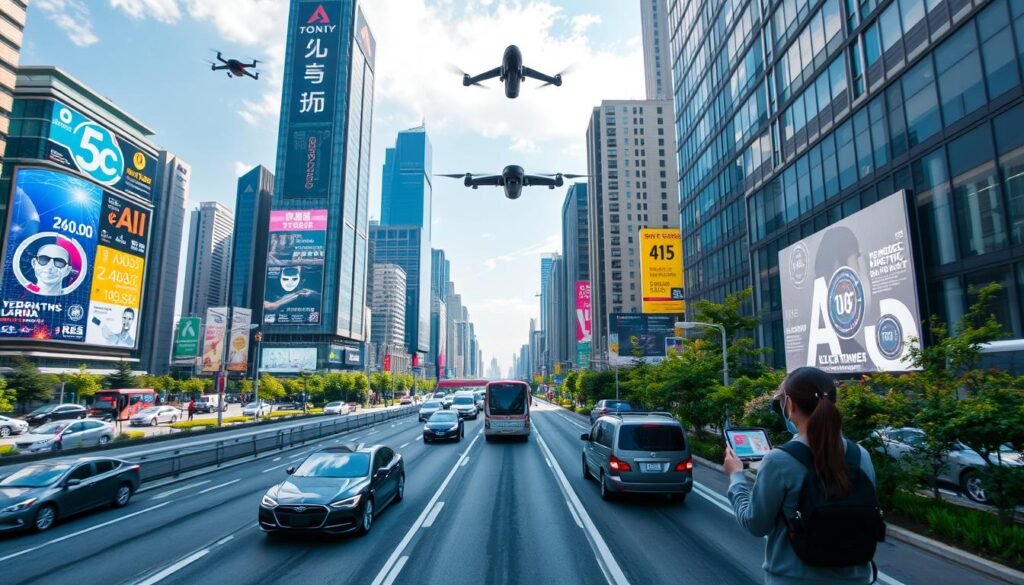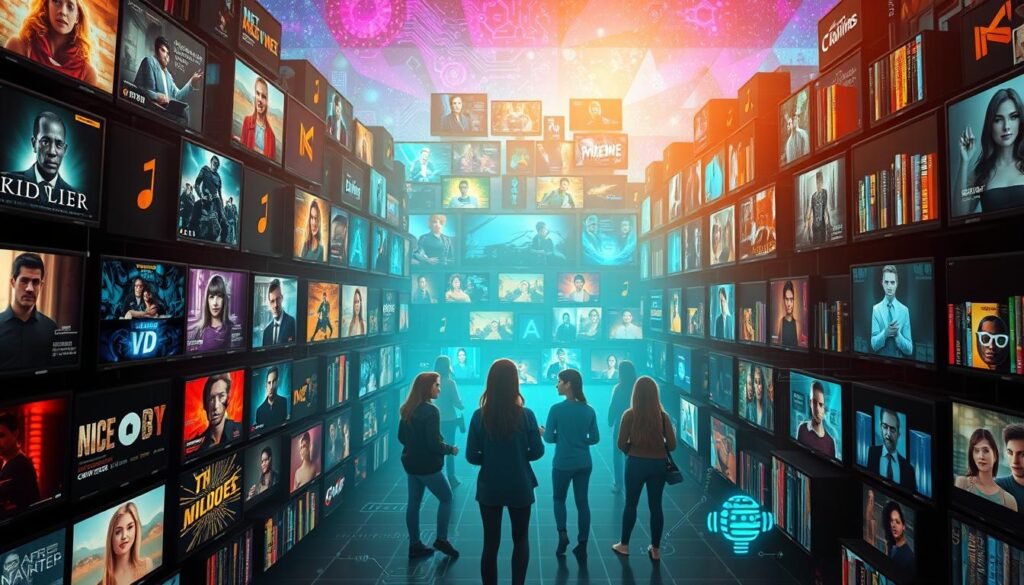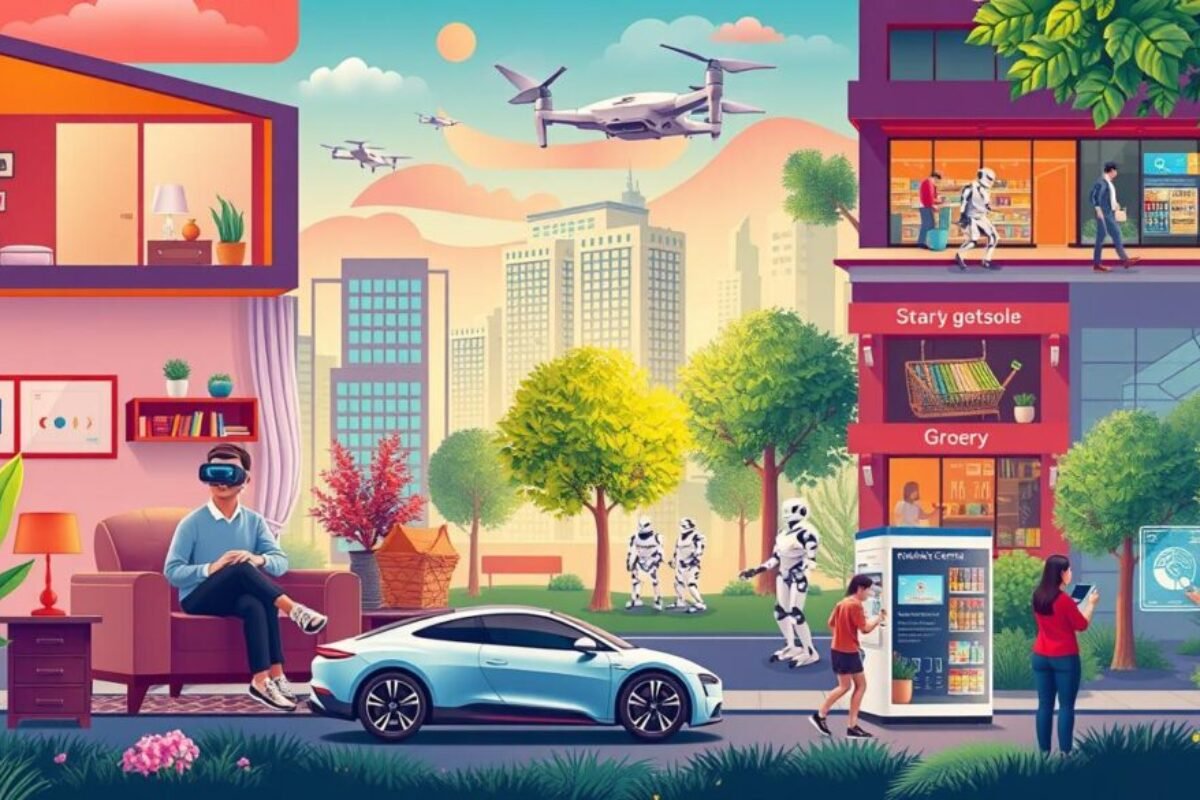Tech and AI are transforming everyday life in 7 surprising ways you might not have realized!
Tech and AI are creating a world where your home anticipates your needs, your car drives effortlessly, and your finances are managed flawlessly. All thanks to artificial intelligence (AI)123. This isn’t just science fiction anymore; it’s our reality. AI has changed our daily lives, making things more efficient and easy.
AI gives us personalized shopping tips and helps in healthcare. Its effects are wide and often unseen. In this article, we’ll look at seven surprising ways AI is changing our lives. We’ll see how it’s quietly transforming how we interact with the world.
Key Takeaways
- Tech and AI have become a big part of our daily lives, changing many industries and making things easier.
- AI is improving healthcare by helping with diagnoses, making tasks easier, and aiding in research.
- Smart homes and voice assistants use AI for better experiences, making things more personal and easy to use.
- AI is changing finance by automating tasks, catching fraud, and giving advice tailored just for you.
- AI is also making transportation better by improving traffic flow, and public transit, and enabling self-driving cars.
Understanding the Evolution of Artificial Intelligence in Daily Life
Artificial intelligence (AI) has grown from science fiction to a big part of our lives. It has changed our digital world in amazing ways. Now, AI is a key part of our daily lives, working with many technologies and changing our experiences in big ways.
From Science Fiction to Reality: The AI Revolution
In recent years, big steps in machine learning and neural networks have made AI real4. The AI market is expected to grow from $150.2 billion in 2023 to $1,345.2 billion by 20304. This shows how fast Tech and AI are growing and being used in many fields.
How Machine Learning Shapes Our Digital World
Machine learning, a key part of AI, has changed how we use technology5. It started growing in the 1950s and 1980s5. Big data and deep learning in the late 2000s and early 2010s made AI even better. Now, AI can look at lots of data and make smart choices that affect our daily lives.
The Impact of Neural Networks on Daily Tasks
Neural networks have changed many parts of our lives4. AI can now read mammograms with 99% accuracy without needing biopsies4. It has also helped make robots for farming, which can weed, monitor crops, and harvest4. These changes have made many things more efficient and convenient for us.
As Tech and AI keep getting better, they fit more easily into our daily lives5. AI is becoming easier to use and understand, making it easier for humans and machines to talk5. From getting personalized tips to using voice-controlled home assistants, AI is making our digital world better and more convenient.
The future of Tech and AI looks very promising4. It could change many industries, improve health, and change how we work and live4. AI might change 40% of jobs worldwide4. There will be more jobs for AI experts, robotics engineers, and designers4. As we move into this AI-driven future, we need to think about the good and bad sides of AI45.
Tech and AI: Revolutionizing Healthcare and Medical Diagnostics
Artificial intelligence (AI) is changing healthcare. It helps doctors diagnose and treat patients better. AI tools can spot diseases early, make medical tests easier, and change how we get care6. But, using AI in healthcare also brings up big ethical questions that need to be thought about carefully.
AI-Powered Tools for Early Disease Detection
AI is great at finding diseases early. It looks at medical images like X-rays and CT scans very well, often better than doctors7. This helps find cancer, heart disease, and brain problems early, leading to better treatment and results.
Streamlining Medical Diagnostics with Machine Learning
Tech and AI are changing how doctors make diagnoses. It uses lots of data to give doctors insights that are just for each patient7. This could make care better, reduce mistakes, and make things run smoother.
The Ethical Implications of AI in Healthcare
AI in healthcare has many good points, but it also brings up big ethical issues. We need to think about privacy and bias, and how it affects jobs in healthcare6. It’s important to make sure AI helps us care for patients without hurting their rights or the healthcare system.
“The true promise of AI in healthcare lies in its ability to augment and empower human experts, not to replace them. By working in tandem, AI and medical professionals can revolutionize the delivery of healthcare services and improve patient outcomes.” – Dr. Emily Johnson, Healthcare AI Specialist
Smart Home Automation and Voice Assistant Technology
Smart home devices and voice assistants have changed how we live. They use AI to understand our voice commands, making our homes smarter8. Now, over a quarter of US adults have a smart speaker, and this number is expected to grow to 55% by 20228. Also, 72% of smart speaker owners use them every day8.
Natural Language Processing in Home Devices
Voice assistants like Alexa and Siri use NLP to understand us. This makes controlling devices and getting information easier9. Thanks to better microphones and speech recognition, voice control is now more popular and easy to use8.
Intelligent Home Security Systems
Tech and AI are also making our homes safer10. It learns our habits to make our homes more secure and comfortable10. Voice control adds to the convenience, making smart homes great for people with disabilities or those who want to simplify their lives8.
Energy Management and Optimization
Smart homes also help save energy10. AI thermostats adjust heating and cooling based on our habits and the weather10. Smart lights turn off when we leave, saving even more energy10. As AI improves, our homes will become even more eco-friendly10.

Smart homes and voice assistants have made our lives easier and more efficient. As technology gets better, we’ll see even more ways AI can make our homes better9.
“Voice control makes smart home technology accessible to individuals with disabilities, empowering them to manage their living spaces with greater independence and convenience.”
| Smart Home Feature | AI-Powered Benefits |
|---|---|
| Home Security |
|
| Energy Management |
|
| Voice Assistants |
|
Transforming Financial Services Through Artificial Intelligence
Artificial Intelligence (AI) has changed the finance world a lot. It affects everything from customer service to stopping fraud. AI chatbots and virtual assistants give quick, personal answers to customer questions, making their experience better11. Machine learning helps in making better credit scores and loan decisions11. Also, AI is key in spotting and stopping fraud by looking at transaction patterns11.
Automating Financial Analysis and Risk Management
Tech and AI are shaking up the finance industry, leading to new ideas and ways of working11. It’s making banking services better and more efficient11. Now, data is the most valuable thing for finance companies, showing how important tech is for new solutions11. AI-powered robo-advisors give personalized investment advice, helping people reach their financial goals. For example, a client saw a 12% increase in returns in a year by using a robo-advisor.12
Enhancing Fraud Detection and Security with AI
AI is a big help in finding and stopping fraud in finance11. Using AI tools to watch client accounts has led to quick fraud detection and action, saving a lot of money12. An AI chatbot has also made customer service better by giving clients quick updates on their investments12. But, we need to think about privacy and explain AI decisions clearly to build trust12.
The finance world will keep changing, with AI getting better at things like machine learning and natural language processing12. We’ll see more advanced financial products made just for each client12. Trends like using AI for ESG investing and improving financial education are also on the rise12.

“The integration of AI in the financial sector has been a game-changer, revolutionizing the way we approach financial analysis, risk management, and fraud detection. As we continue to harness the power of AI, the future of finance holds immense for personalized and efficient services that cater to the evolving needs of our clients.”
In summary, AI’s impact on finance is huge. It’s changing how we do financial analysis, risk management, and fraud detection. AI is also making investment advice more personal. As finance keeps evolving, using AI wisely will be key for staying ahead and meeting client needs.
AI-Powered Navigation and Transportation Systems
The transportation world is changing fast, thanks to AI. Self-driving cars and smart traffic systems are just the start. Tech and AI are making our travel safer and more efficient13.
Self-Driving Vehicle Technology
Self-driving cars use AI to make driving safer and easier. They watch the road, predict traffic, and keep everyone safe14.
Traffic Management and Route Optimization
Tech and AI are changing how we manage traffic. It uses data from GPS and cameras to smooth out traffic. This helps drivers find the best routes and saves time13.
In logistics, AI plans routes to save fuel and time. It also helps drivers avoid traffic, making deliveries on time13.
Public Transportation Enhancement
Tech and AI are making public transport better. It makes driving safer and improves job satisfaction for drivers13. AI also helps keep drivers alert and skilled, making travel safer13.
But, AI in transport has its challenges. There are tech and legal hurdles to cross13. Yet, it could also create new jobs in maintenance and AI operation13.
As transport evolves, AI will be key to a better future. Keeping these systems running smoothly is vital for happy customers13.

Personalized Entertainment and Content Recommendations
In today’s digital world, personalized content and smart recommendations have changed how we enjoy entertainment. Services like Netflix and Spotify use AI to give us shows and music we’ll love. This is thanks to artificial intelligence (AI) that knows our likes and viewing habits1516.
The Power of Data in Personalizing User Experiences
AI systems like OpenAI’s MuseNet and Jukedeck, and Google’s DeepDream, are creating new music and visuals15. They use machine learning to get to know us better. This helps them suggest content that fits our tastes, making our entertainment better16.
How Algorithms Predict What You Want to Watch Next
Platforms like Netflix, YouTube, and Spotify count on AI for their suggestions15. Netflix uses smart algorithms to guess what we might like next, based on what we’ve watched before15. Spotify makes playlists just for us, using our listening history15. TikTok even uses AI to show us the latest trends and viral videos15.
Data Privacy and Personalized Content: Finding the Balance
Personalized content makes our entertainment better, but it also worries us about privacy16. As AI gets smarter, we need to find a way to keep our data safe while enjoying tailored shows and music16.

“The key to unlocking the full potentia of personalized entertainment lies in striking the right balance between innovation and privacy protection.”
AI in E-commerce and Shopping Experience
Artificial intelligence (AI) is changing the e-commerce world. It makes shopping better for customers and helps businesses run smoother. AI is changing how we find, buy, and get products online.
Smart Product Recommendations
E-commerce sites and online ads use AI to suggest products based on what you like and have bought before. AI looks at what you browse, buy, and who you are to give you the best picks. This makes shopping more fun and can help businesses make more money and keep customers coming back.
Virtual Shopping Assistants
AI-powered virtual shopping assistants help make shopping easier and more fun. They understand what you say and suggest products that fit what you’re looking for. This helps sell more and makes customers happier17. More and more, people want to shop with these AI helpers18.
Inventory Management Systems
AI also helps manage stock for online stores. It uses data to guess how much to order and when to ship. This keeps stores stocked and helps avoid lost sales19. Soon, AI will make managing stock easier for everyone, not just experts19.
AI is making shopping online better and easier for everyone. It helps retailers too by making things run smoother. From finding the right products to managing stock, AI is changing how we shop online.
| AI-Powered eCommerce Solutions | Key Benefits |
|---|---|
| Personalized Product Recommendations | |
| Virtual Shopping Assistants | |
| Inventory Management Systems |
“AI tools in eCommerce can change businesses by analyzing customers, managing stock, and personalizing experiences.”17
As AI gets better, e-commerce sites that use it will do great. They’ll offer amazing shopping experiences and run their businesses well. This will help them grow and succeed online191718.
The Future of Work: AI and Automation in Professional Life
Artificial intelligence (AI) and automation are changing the workplace. They offer new chances but also bring challenges. These technologies could make work more efficient but might also replace jobs and change what we do at work20.
Experts say up to 30% of jobs, or 800 million workers, could be lost to automation soon20. Yet, these same technologies could also create 555 million to 890 million new jobs. This shows how work is constantly evolving20.
The Ethical Challenges of AI and Automation in Professional Life
AI in the workplace raises many ethical questions. We need to think about AI bias, how decisions are made, and how it affects worker well-being21. It’s important to lead with ethics and use AI responsibly to protect workers’ rights and dignity21.
Preparing for the Future: Upskilling for an AI-Integrated Workplace
AI and automation are changing work fast. We need to keep learning and upskill to keep up21. Workers must learn new skills to work with new technologies22.
This change needs teamwork from employers, educators, and workers. We must work together to prepare for the future of work21.
The Future of Work: Balancing Innovation with Workforce Well-Being
AI and automation must be used wisely in work. We need to balance new ideas with taking care of workers22. Tools like ChatGPT can help but we must think about their impact on jobs and how we interact with each other22.
It’s key to make sure these technologies help everyone and respect workers’ rights and dignity as we move forward21.
We must be careful with AI and automation in work. We need to address ethical, social, and work-related issues21. By upskilling, using AI responsibly, and focusing on worker well-being, we can make a better future21.
“The integration of AI into business operations is not a threat but a tool that, when used ethically and strategically, can unlock new potentials and unprecedented growth in professional settings.”21
Privacy and Security Considerations in AI Integration
Artificial intelligence (AI) is now a big part of our lives. We need to focus on privacy and security more than ever. AI systems need lots of personal data, which can lead to data breaches and misuse23. It’s a big challenge for companies and policymakers to find a balance between AI’s benefits and protecting our data.
Understanding the Privacy Risks of AI Systems
AI has brought new privacy risks24. Cybercrimes can harm AI systems, exposing our personal info24. AI can also be used to create fake profiles or alter images, hurting trust and privacy24. There’s also worry that AI might keep and spread biases, making privacy and ethics worse.
Data Protection: Safeguarding Sensitive Information in AI Models
Keeping AI models safe is key to keeping user trust and following data protection laws24. The risk of personal data being stolen or lost is a big worry24. Companies like Apple are leading the way with on-device AI processing, keeping data safe and under user control.
Balancing Innovation and Privacy in AI Development
AI is changing many industries, like healthcare, finance, and transportation2324. Finding a balance between innovation and privacy is vital2324. While many use AI for business, concerns about ethics and security hold some back23. The AI industry is growing fast, but we need clear rules to protect privacy23.
As AI keeps evolving, we must all work together to solve privacy and security issues. By focusing on ethical AI and strong data protection, we can use these technologies fully while keeping our privacy and trust safe.
“The widespread adoption of AI has brought forth new privacy risks, and it is vital that policymakers, industry leaders, and the public work together to address these concerns.”
Conclusion: Embracing the AI-Driven Future
Artificial intelligence (AI) is changing our lives in big ways. It can make things easier, more efficient, and productive in many areas. But, we need to think about the ethics and limits of this technology25.
AI is making huge strides in healthcare, finance, entertainment, and transportation. It’s making these areas better and more personalized. Yet, we must worry about our privacy, security, and jobs25.
To move forward with AI, we need to find a balance. We should use AI’s benefits while making sure it’s used right. This means teaching digital skills, setting ethical rules, and making sure AI fits with our goals2526.
FAQ
What are some surprising ways AI is impacting our daily lives?
How has AI transitioned from science fiction to reality?
How is AI transforming the healthcare industry?
How are smart home devices and voice assistants using AI?
In what ways is AI impacting the finance industry?
How is AI transforming the transportation industry?
How are streaming platforms and social media using AI?
How is AI enriching the e-commerce shopping experience?
What are the opportunities and challenges of AI in the workplace?
What are the privacy and security concerns surrounding AI?
Source Links
- AI in Everyday Life: 7 Surprising Applications You Didn’t Know About
- 10 Surprising Applications of AI in Your Daily Life
- AI in Everyday Life: Transforming Our Lives More Than We Realize?
- The Evolution and Future of Artificial Intelligence | CMU
- Artificial Intelligence 101: Its Evolution, Implications And Possibilities
- Artificial intelligence in healthcare: transforming the practice of medicine
- Revolutionizing healthcare: the role of artificial intelligence in clinical practice – BMC Medical Education
- Voice Control in the Smart / Connected Home, What you Need to Know
- How AI in smart home tech can automate your life
- The Future of Home Automation: How AI and Voice Assistants Are Transforming Smart Living
- How Artificial Intelligence is Transforming the Financial Services Industry
- Council Post: The Transformative Impact Of AI On Financial Services
- AI Trends in the Trucking Industry | Noregon
- AI in Automotive: Driving the Future of Transportation
- AI in Entertainment: From Content Creation to Recommendation Systems
- Council Post: AI Is Personalizing Our Entertainment Experiences In Big Ways
- How Artificial Intelligence in eCommerce Works
- Council Post: From AI To AR: E-Commerce Tech That’s Now Nonnegotiable
- How Ecommerce AI is Transforming Business in 2024
- AI, automation, and the future of work: Ten things to solve for
- Council Post: AI And The Future Of Work
- The future of work: How will AI and automation affect work?
- AI and Privacy: Safeguarding Data in the Age of Artificial Intelligence | DigitalOcean
- AI and Privacy: The privacy concerns surrounding AI, its potential impact on personal data
- Embracing AI: Opportunities and Challenges for Associations – .orgSource
- Council Post: Marketing 2.0: Embracing The AI-Powered Future





March 4, 2025 @ 5:58 pm
Thanks for sharing. I read many of your blog posts, cool, your blog is very good. https://accounts.binance.com/pt-BR/register-person?ref=YY80CKRN
March 10, 2025 @ 11:46 pm
Can you be more specific about the content of your article? After reading it, I still have some doubts. Hope you can help me.
June 30, 2025 @ 3:06 pm
Thanks for sharing. I read many of your blog posts, cool, your blog is very good.
July 3, 2025 @ 8:21 pm
Your article helped me a lot, is there any more related content? Thanks!
July 31, 2025 @ 3:47 am
Thanks for sharing. I read many of your blog posts, cool, your blog is very good.
August 10, 2025 @ 1:09 am
Thanks for sharing. I read many of your blog posts, cool, your blog is very good.
August 14, 2025 @ 3:26 am
Your point of view caught my eye and was very interesting. Thanks. I have a question for you.